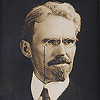
Arthur Cushman McGiffert
Encyclopedia

United States
The United States of America is a federal constitutional republic comprising fifty states and a federal district...
theologian
Theology
Theology is the systematic and rational study of religion and its influences and of the nature of religious truths, or the learned profession acquired by completing specialized training in religious studies, usually at a university or school of divinity or seminary.-Definition:Augustine of Hippo...
, was born in Sauquoit, New York, the son of a Presbyterian clergyman of Scots-Irish descent.
He graduated at Western Reserve College
Western Reserve College
Western Reserve College may refer to:* Western Reserve Academy, a private, mid-sized, coeducational boarding and day college preparatory school located in Hudson, Ohio...
in 1882 and at Union Theological Seminary
Union Theological Seminary in the City of New York
Union Theological Seminary in the City of New York is a preeminent independent graduate school of theology, located in Manhattan between Claremont Avenue and Broadway, 120th to 122nd Streets. The seminary was founded in 1836 under the Presbyterian Church, and is affiliated with nearby Columbia...
in 1885, studied in Germany
Germany
Germany , officially the Federal Republic of Germany , is a federal parliamentary republic in Europe. The country consists of 16 states while the capital and largest city is Berlin. Germany covers an area of 357,021 km2 and has a largely temperate seasonal climate...
(especially under Harnack) in 1885-1887, and in Italy and France in 1888, and in that year received the degree of doctor of philosophy at Marburg. He was instructor (1888-1890) and professor (1890 1893) of church history at Lane Theological Seminary
Lane Theological Seminary
Lane Theological Seminary was established in the Walnut Hills section of Cincinnati, Ohio, in 1829 to educate Presbyterian ministers. It was named in honor of Ebenezer and William Lane, who pledged $4,000 for the new school, which was seen as a forward outpost of the Presbyterian Church in the...
, and in 1893 became Washburn professor of church history in Union theological seminary, succeeding Dr Philip Schaff
Philip Schaff
Philip Schaff , was a Swiss-born, German-educated Protestant theologian and a historian of the Christian church, who, after his education, lived and taught in the United States.-Biography:...
. He became the 8th president of Union Seminary in 1917.
His published work, except occasional critical studies in philosophy, dealt with church history and the history of dogma
Dogma
Dogma is the established belief or doctrine held by a religion, or a particular group or organization. It is authoritative and not to be disputed, doubted, or diverged from, by the practitioners or believers...
. His best known publication is a History of Christianity in the Apostolic Age (1897). This book, which sustains critical historical eminence to this day, by its independent criticism and departures from traditionalism, aroused the opposition of the General Assembly of the Presbyterian Church; though the charges brought against McGiffert were dismissed by the Presbytery of New York, to which they had been referred, a trial for heresy
Heresy
Heresy is a controversial or novel change to a system of beliefs, especially a religion, that conflicts with established dogma. It is distinct from apostasy, which is the formal denunciation of one's religion, principles or cause, and blasphemy, which is irreverence toward religion...
seemed inevitable, and McGiffert, in 1900, retired from the Presbyterian ministry and retained his credentialed status by eager recognition from a Congregational Church
Congregational church
Congregational churches are Protestant Christian churches practicing Congregationalist church governance, in which each congregation independently and autonomously runs its own affairs....
. Likewise he retained his distinguished position at Union Theological Seminary.
A History of Christian Thought constituted a two volume work (1932, 1933) which established an American standard in theological studies and is still cited regularly by scholars. Among his other publications are: A Dialogue between a Christian and a Jew (1888); a translation (with introduction and notes) of Eusebius
Eusebius of Caesarea
Eusebius of Caesarea also called Eusebius Pamphili, was a Roman historian, exegete and Christian polemicist. He became the Bishop of Caesarea in Palestine about the year 314. Together with Pamphilus, he was a scholar of the Biblical canon...
's Church History (1890); and The Apostle's Creed (1902), in which he attempted to prove that the old Roman creed was formulated as a protest against the dualism
Dualism
Dualism denotes a state of two parts. The term 'dualism' was originally coined to denote co-eternal binary opposition, a meaning that is preserved in metaphysical and philosophical duality discourse but has been diluted in general or common usages. Dualism can refer to moral dualism, Dualism (from...
of Marcion
Marcion of Sinope
Marcion of Sinope was a bishop in early Christianity. His theology, which rejected the deity described in the Jewish Scriptures as inferior or subjugated to the God proclaimed in the Christian gospel, was denounced by the Church Fathers and he was excommunicated...
and his denial of the reality of Jesus
Jesus
Jesus of Nazareth , commonly referred to as Jesus Christ or simply as Jesus or Christ, is the central figure of Christianity...
's life on earth.

